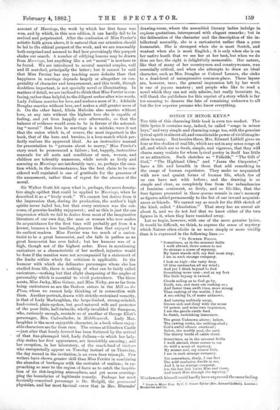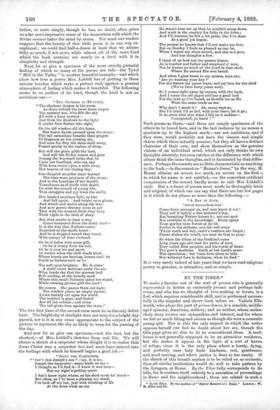SONGS IN MINOR KEYS.*
THE title of this charming little book is even too modest. The little lyrics it contains may, indeed, be called "songs in minor keys," and very simple and charming songs too, with the genuine lyrical spirit in almost all, and considerable power of vivid imagin- ation in many. But besides these, Mrs. Edward Liddell gives us four or five studies of real life, which are not in any sense songs at. all, and which are so fresh, simple, and vigorous, that they will charm many realists for whom lyrical poetry in itself has little or no attraction. Such sketches as " Felicitis," "The Gift o' God," "The Highland Glen," and "Jesus the Carpenter,' have a life and breadth in them that add something to the range of human experience. They make us acquainted with new and quaint forms of human life, which few of us can have met with before ; and the drawing is so simple and clear, so completely free from the redundancies of feminine sentiment, so lively, and so life-like, that the four figures presented in these .poems remain in one's memory as figures added permanently to the list of our inward acquaint- ances or friends. We cannot say as much for the fifth sketch of the kind, called "Absolution." That story has an unreal air about it, and we do not feel that we know either of the two. figures in it, when they have vanished away.
Let us begin, however, with one of the more genuine lyrics.. It would be difficult, we think, to express the sense of mystery which Nature often elicits in us more simply or more vividly than it is expressed in the following lines :—
"IN SUMNER FIELDS.
Sometimes, as in the 'rummer fields I walk abroad, there comes to me
So strange a sense of mystery,
My heart stands still, my feet must stay, I am in such strange company.
I look on high—the vasty deep Of blue outreaches all my mind ; And yet I think beyond to find Something more vast—and at my feet The little bryony is twined.
Clouds sailing as to God go by, Earth, sun, and stars are rushing on ; And faster than swift time, more strong Than rushing of the worlds, I feel A smtething Is, of name unknown.
And turning suddenly away, Grown sick and dizzy with the sense Of power, and mine own impotence, I see the gentle cattle feed In dumb, unthinking innocence.
The great Unknown above; below, The cawing rooks, the milking-shed ; God's awful silence overhead ; Below, the muddy pool, the path The thirsty herds of cattle tread.
Sometimes, as in the summer fields I walk abroad, there comes to me So wild a sense of mystery, My senses reel, my reason fails, I am in such strange company.
Yet somewhere, dimly, I can feel The wild confusion dwells in me, And I, in no strange company, Am the lost link 'twixt Him and these,
And touch Him through the mystery."
Wordsworth himself could hardly have expressed the same feeling
• Sono in Minor Keys. By O. C. rraser-Tytier (Mn. Edward Liddell). London Macmillan and Co.
better, or more simply, though he has, no doubt, often given us a far more impressive sense of the momentum with which the divine essence takes the mind by storm. Nor must our readers suppose that the beauty of this little poem is in any way ex- ceptional; we could find half-a-dozen at least that we admire fully as much, if not more, while almost all of the same kind which the book contains are nearly on a level with it in simplicity and strength.
Next, let us give a specimen of the more strictly pictorial feeling of which so many of the poems are fall,—the Tyrol "Mill in the Valley" is another beautiful example,—and which show how true a power Mrs: Liddell has of putting in those minute touches which make a picture real, against a general atmosphere of feeling which makes it beautifuL The following seems to us perfect of its kind, though the kind is not an ambitious one :— "THE OUTLOOK (A PICTURE).
"The shadows deepen in the room As down behind the trees there slopes The summer sun, who fills the sky All with a hazy ecstacy And from the shadows to the light A quaint face flashes into sight.
On the old window-sill she leans, Her warm hands pressed upon the stone : The tall carnations breathe their prayer Of fragance on the evening air, And soon for Day the skies shall weep, Passed gently to the realms of sleep.
But still the glory gilds the land, And still the flicker comes and goes Among the wayward locks that lie Upon her forehead, who can spy With keen sweet eyes, a mile away, Her beacon of the closing day.
One dimpled shoulder leans beyond The time-worn grayness of the stone ; And to the heavings of her breath, Tumultuous as of strife with death, Or with the tumult of young life, That struggles and yet loves the strife, Her beaded necklace falls, to rise And fall again. And bright eyes gleam, And watch and watch along the way, And now grown dreamy seem to say That with the roosted birds they keep Their vigils in the land of sleep.
But they awake to hear a step
Come measured down the dusty road—
It is the way that Fathers come, Expected at the sunlit home : And be it dappled sward they tread, With canopy of blue o'erhead, 'Or be it laden with some gift, Or be it weary from his toil, 'Or be it over ice and snow, In winter when the chill winds blow, Where hearts are beating, homes shall be Sunlit to fathers such as he.
The soft eyes brighten. He is come !
A shrill sweet welcome parts the air. What heeds she that the passers look Soft smiling, at the homely nook Where this small Patience takes her stand, While evening glories gild the land P
He comes. She passes from our sight.
The window place, an empty square, Looks blankly out upon the world. The sentinel is gone, and furled Are all her colours ; and alone
The tall pinks lean against the stone."
The two first lines of the second verse seem to us the only defect here. The bright sky of starlight does not weep for a bright day passed, nor is it in any sense appropriate to the subject of the picture to represent the sky as likely to weep for the passing of the day.
And now let us give one specimen,—not the best, but the shortest.,—of Mrs. Liddell's sketches from real life. We will -choose a sketch of a carpenter whose delight it is to realise that Jesus Christ was a carpenter too, and must have entered into the feelings with which he himself begins a good job :— "JESUS THE CARPENTER. "'ISN'T this Joseph's son P'—ay, it is he ; Joseph the carpenter—same trade as me— I thought as I'd find it—I knew it was here—
Bat my sight's getting queer.
I don't know right where, as his shed mast ha' stood—
But often, as I've been a-planing my wood, I've took off my hat, just with thinking of He At the same work as me.
He warn't that set up that he couldn't stoop down And work in the country for folks in the town ;
And I'll warrant he felt a bit pride, like I've done At a good job begun.
The parson he knows that I'll not make too free, But on Sunday I feels as pleased as can be, When I wears my clean smock, and sits in a pew, And has thoughts a few.
I think of as how not the parson hissen, As is teacher and father and shepherd o' men, Not he knows as mach of the Lord in that shed, Where He earned His own bread.
And when I goes home to my missas, says she, Are ye wanting your key ?'
For she knows my queer ways, and my love for the shed (We've been forty years wed).
So I comes right away by mysen, with the book, And I turns the old pages and has a good look For the text as I've found, as he tells me as He Were the same trade as me.
Why don't I mark it ? Ah, many says so, But I'd think I'd as lief, with your leave, let it go ; It do seem that nice when I fall on it sudden— Unexpected, ye know ! "
Such poems as these,—and these are simply specimens of the others to be found here, and in the last instance by no means a specimen up to the highest mark,—are not ambitions, and if they were, would probably not have the sincere and simple charm which these actually possess ; but they all have a distinct character of their own, and show themselves as the genuine visions of an individual mind, which not only thinks its own thoughts sincerely, but even catches at the difference with which others think the same thoughts, and is fascinated by that differ- ence. Perhaps the sonnets are as little characteristic as anything in the book,—in the sonnet on " Renan's Jesus," by the way, M. Renan obtains an accent too much, an accent on the first e, to which his name is not entitled,—as the somewhat artificial compression of the sonnet hardly seems to snit Mrs. Liddell's style. But a volume of poems must needs be thoroughly fresh and original, of which one can say that there are but few pages in it which do not please us more than the following :—
"A DAY IN JUNE.
'Out of heaven from God.'
Como down amongst us, and men know it not ! They call it lightly a fine summer's day, But breathing Nature knows it; not one spot But trembles at the knowledge. Every spray From garden unto forest at its lot
Smiles in the stillness, and the veil away 'Twixt earth and sky, earth's confines are forgot ; Praise shakes the world, too near its God to pray.
So when the Glory of the Godhead came Long years ago and trod the paths of men, They called Him prophet, and his words of flame The poet's madness. Earth at her Lord's name Was speechless ; but 'twas hers alone to hide Her widowed face in darkness, when he died."
It is very rarely indeed of late years that we have read religious poetry so genuine, so attractive, and so simple.



































 Previous page
Previous page